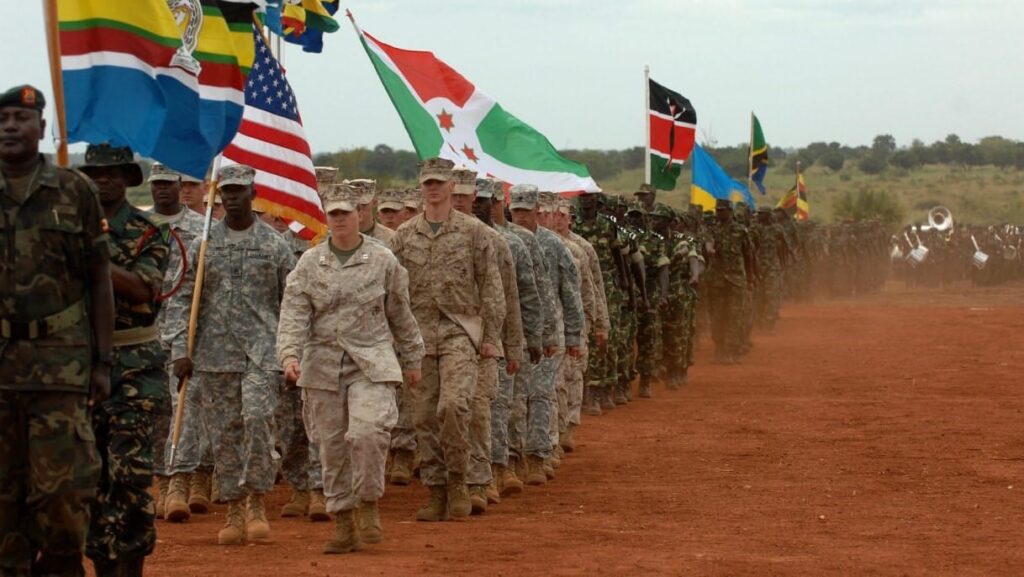In Summary
- The U.S. military has expanded its presence in Africa, hosting approximately 29 bases across 15 nations as of 2025, with missions aimed at combating terrorism, stabilizing regions, and countering the growing influence of global rivals.
- Projected shifts under Donald Trump’s administration, based on past policies and current trends, suggest possible troop reductions, enhanced reliance on local forces, and a stronger focus on countering China’s growing influence in Africa.
- Niger, once a significant hub for U.S. military operations in Africa, ordered U.S. troops to leave following the 2023 coup. This decision led to the withdrawal of all U.S. forces by late 2024, drastically reducing the U.S. military presence in the country.
Deep Dive!!
The United States’ military operations in Africa have been a cornerstone of its counterterrorism and geopolitical strategies. With bases spread across the Sahel, Horn of Africa, and beyond, these missions address persistent security challenges such as insurgencies, extremism, and regional instability. As of 2024, the U.S. military’s presence in Africa has reached critical importance, not just for addressing security threats but also for countering the influence of rival powers like China and Russia.
Under Donald Trump’s administration, significant policy shifts are anticipated. Known for his “America First” stance, Trump’s second term is projected to alter U.S. military engagements in Africa, focusing on reducing direct interventions while strengthening economic and strategic ties. These projections, rooted in current trends and facts, suggest a reshaping of alliances and operations across the continent. This article provides a comprehensive analysis of these projections, supported by data and geopolitical trends, to offer an in-depth understanding of the future of the U.S.-Africa military relations.
10. Morocco
Morocco is an important U.S. military partner in North Africa, particularly in counterterrorism and maritime security. U.S. forces conduct joint exercises like African Lion to strengthen military collaboration. In 2024, U.S. support focused on intelligence-sharing and training Moroccan forces. With Trump’s “America First” policy, the U.S. is likely to continue its partnership with Morocco, emphasizing non-combat support and regional stability while reducing direct military interventions.
9. Chad
Chad continues to play a crucial role in U.S. counterterrorism efforts in the Sahel. The country’s location near the Lake Chad Basin is vital for combating extremist groups like Boko Haram and ISIS. In 2024, U.S. support included intelligence-sharing, training, and counterterrorism operations. Under Trump’s administration, U.S. military involvement in Chad is expected to focus on strategic partnerships with local forces, continuing counterterrorism efforts while maintaining a reduced troop presence.
8. Cameroon
Cameroon’s fight against Boko Haram has positioned it as a critical partner for U.S. military operations in Central Africa. In 2024, U.S. support included training local forces and providing advanced equipment. The country’s proximity to the Lake Chad Basin, a hotspot for extremist activity, underscores its strategic significance. Moving into 2025, U.S. efforts are expected to expand to include humanitarian initiatives aimed at addressing the root causes of extremism.
7. Senegal
Situated on the Atlantic coast, Senegal has become a critical location for U.S. naval and counterterrorism operations. In 2024, U.S. forces expanded training programs focused on combating transnational crime and terrorist networks. Senegal’s strategic position near West Africa’s troubled Sahel region makes it an essential partner. As of 2025, this partnership is expected to deepen, particularly in intelligence-sharing and regional security initiatives.
6. Ghana
Ghana has emerged as a strategic partner for the U.S., hosting military training exercises and providing logistical support for operations in West Africa. The African Lion drills in 2024 underscored Ghana’s role in enhancing interoperability between U.S. and African forces. With its stable political environment, Ghana offers a secure base for addressing threats emanating from neighboring Sahel nations. Projections for 2025 indicate increased collaboration, particularly in maritime security, as the U.S. seeks to pivot away from politically unstable partners like Niger.
5. Mali
Mali has long been a frontline state in the battle against terrorism in the Sahel. U.S. involvement has primarily focused on training local forces to combat jihadist groups operating in the region. However, political instability has complicated these efforts. In 2024, U.S. activities were scaled back following a series of coups and growing anti-Western sentiments. As of 2025, Mali remains a challenging but strategically important partner for U.S. operations in the Sahel.
4. Tunisia
Tunisia, a key ally in North Africa, has been a focal point for U.S. counterterrorism operations targeting ISIS-linked groups. The country’s proximity to the Mediterranean and its role as a gateway to Europe make it strategically indispensable. In 2024, joint military exercises aimed at improving intelligence and counterterrorism capabilities highlighted Tunisia’s importance. Projections for 2025 indicate sustained U.S. involvement, with a focus on strengthening regional stability amidst rising geopolitical tensions.
3. Somalia
Somalia remains a hotspot for U.S. military operations, with efforts focused on combating al-Shabab and other extremist groups. Airstrikes and training programs dominated U.S. activities in 2024, making Somalia a key battleground in the global fight against terrorism. As of 2025, U.S. operations are expected to persist, with a focus on bolstering Somalia’s capacity to maintain its own security.
2. Kenya
Kenya is a linchpin of U.S. military strategy in East Africa, hosting Camp Simba and serving as a base for counterterrorism missions targeting al-Shabab. In 2024, Kenya’s strategic importance was reinforced through joint exercises and intelligence-sharing initiatives. Projections for 2025 indicate increased U.S. support, particularly in military aid and capacity-building, as Kenya continues to play a vital role in regional stability.
1. Djibouti
Djibouti, home to Camp Lemonnier, is the most significant U.S. military base in Africa. This facility, housing approximately 5,000 personnel, serves as a launchpad for operations across the Horn of Africa and the Arabian Peninsula. Its strategic location near the Bab-el-Mandeb Strait ensures control over key maritime routes. Projections for 2025 suggest continued expansion of operations, reinforcing Djibouti’s role as a cornerstone of U.S. strategy in Africa.
https://www.africanexponent.com/top-10-african-nations-with-the-most-u-s-military-presence-and-the-possible-impacts-of-trumps-administration/


